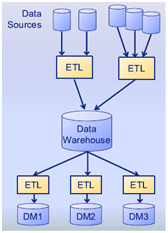“Information Management (IM) describes the means by which an organisation efficiently plans, collects, organises, uses, controls, disseminates and disposes of its information, and through which it ensures that the value of that information is identified and exploited to the fullest extent.” - Barbara Laffan
IM deals with Collection, Management and Distribution of Information across audiences ie process, people, and purpose; the services under the Management are depicted in the following Cube. Many of these services closely relate to & overlap with that of Data Management practices.
IM creates the link between Data, Information and Knowledge, and enhance their Utility for a Business Entity.
Data from multiple sources are cleansed, validated and reorganized into a Dimensional Model, stored and presented in such a way to enable faster analysis and decision making. The reliability of such analysis and decisions depends on the quality of data and the rules embedded to transform data into useful information. The speed of the analysis and decision making depends on the way the data is stored, latency caused by the Information Management Services layer and the Delivery Mechanism.
The success of an IM implementation depends on how effectively it is delivered to meet the requirements of Business process, people and purpose, and its continued utility by the above audiences to meet entity's mission.
Disciplines of IM
Technology rarely produces substantial benefits unless it is properly aligned with the people and processes that it is meant to support. We can help you to organise and take control of your information at all stages of its life cycle to guarantee full compliance with applicable laws while increasing productivity and efficiency, and reducing risks and costs.

